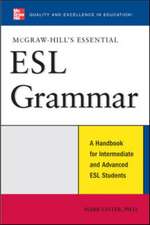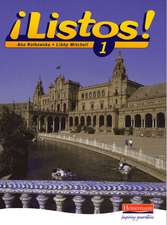Portuguese: A Reference Manual
Autor Sheila R. Ackerlind, Rebecca Jones-Kelloggen Limba Engleză Paperback – sep 2011
The Manual reflects the language as it is currently taught at both the undergraduate and graduate levels by providing detailed explanations of the sound and writing systems and the grammar of the principal Portuguese dialects. A reference guide rather than a textbook, the Manual also provides extensive verb charts, as well as comparisons of Portuguese with English and Spanish.
Preț: 246.48 lei
Nou
Puncte Express: 370
Preț estimativ în valută:
47.16€ • 49.34$ • 39.18£
47.16€ • 49.34$ • 39.18£
Carte disponibilă
Livrare economică 13-27 martie
Livrare express 26 februarie-04 martie pentru 56.81 lei
Preluare comenzi: 021 569.72.76
Specificații
ISBN-13: 9780292726734
ISBN-10: 0292726732
Pagini: 378
Ilustrații: 1 map
Dimensiuni: 216 x 279 x 29 mm
Greutate: 1.07 kg
Editura: University of Texas Press
Colecția University of Texas Press
ISBN-10: 0292726732
Pagini: 378
Ilustrații: 1 map
Dimensiuni: 216 x 279 x 29 mm
Greutate: 1.07 kg
Editura: University of Texas Press
Colecția University of Texas Press
Notă biografică
Sheila R. Ackerlind is Professor Emerita at the U.S. Military Academy at West Point. She taught Portuguese and Spanish for forty years.
Rebecca Jones-Kellogg is Assistant Professor of Portuguese at West Point and has traveled extensively throughout Portugal, Brazil, and Lusophone Africa.
Rebecca Jones-Kellogg is Assistant Professor of Portuguese at West Point and has traveled extensively throughout Portugal, Brazil, and Lusophone Africa.
Cuprins
- The Portuguese-Speaking World
- Preface and Acknowledgements
- Abbreviations, Symbols, and Diacritical Marks
- Phonetic Symbols
- Linguistic and Grammatical Terms in English and Portuguese
- Definitions of Linguistic and Grammatical Terms
- Orthographic Reforms
- Sound System
- Oral Vowels
- Oral Diphthongs
- Nasal Vowels
- Nasal Diphthongs
- Portuguese and Corresponding Spanish Vowels and Diphthongs
- Consonants
- Writing System and Accentuation
- Alphabet
- Letters Used to Transcribe Portuguese Sounds
- Capitalization
- Punctuation Marks and Commonly Used Typographic Symbols
- Diacritical Marks
- Syllables and Word Division
- Stress and Accentuation
- Words Stressed on the Second-to-Last Syllable (Proparoxytones)
- Words Stressed on the Next-to-Last Syllable (Paroxytones)
- Words Stressed on the Last Syllable (Oxytones)
- Portuguese, Spanish, and English Cognates
- Cognates
- Portuguese and Corresponding Spanish and English Sounds and Letters
- Portuguese and Corresponding Spanish Sounds and Letters
- Portuguese and Corresponding Spanish and English Prefixes
- Portuguese and Corresponding Spanish and English Suffixes
- Differences in Stress between Portuguese and Spanish Cognates
- True, Partial, and False Cognates
- Grammatical Categories
- Articles
- Definite and Indefinite Articles
- Contractions of Prepositions with Articles
- Nouns and Adjectives
- Adjectives
- Plural of Nouns and Adjectives
- Gender of Nouns and Adjectives
- Differences in Gender between Portuguese and Spanish Noun Cognates
- Placement of Adjectives with Nouns
- Diminutives and Augmentatives
- Numbers and Numerals
- Adverbs
- Comparatives and Superlatives
- Comparisons of Equality
- Comparisons of Superiority and Inferiority
- Relative Superlatives
- Absolute Superlatives
- Personal Pronouns
- Subject Pronouns
- Forms of Address
- Prepositional Pronouns and Contractions with Prepositions
- Direct Object Pronouns
- Indirect Object Pronouns
- Placement of Object Pronouns
- Reflexive Pronouns and Verbs
- Possessive Adjectives and Pronouns
- Demonstrative Adjectives and Pronouns
- Contractions of Prepositions with Demonstratives
- Relative Words
- Interrogative Words
- Affirmative, Negative, and Indefinite Words
- Prepositions
- Verbs and Corresponding Prepositions
- Conjunctions
- Verbs
- Impersonal and Personal Infinitive
- Past Participle and Compound Tenses and Forms
- Passive Voice
- Indicative Mood
- Present Tense
- Forms
- Uses
- Present Perfect Tense
- Imperfect (Preterite Imperfect) Tense
- Forms
- Uses
- Preterite (Preterite Perfect) Tense
- Forms
- Uses
- Preterite versus Imperfect
- Simple and Compound Past Perfect (Pluperfect) Tense
- Future Tense
- Future Perfect Tense
- Conditional Tense
- Conditional Perfect Tense
- Present Tense
- Subjunctive Mood
- Present Tense
- Present Perfect Tense
- Past (Imperfect) Tense
- Past Perfect (Pluperfect) Tense
- Future Tense
- Future Perfect Tense
- Subjunctive in Subordinate Clauses
- Subjunctive in Noun Clauses
- Subjunctive in Adjective Clauses
- Subjunctive in Adverb Clauses
- Subjunctive in Conditional Sentences
- Subjunctive in Common Expressions
- Present Participle and Progressive Tenses and Forms
- Imperative Mood
- Impersonal Verbs and Expressions
- Verbs That Take an Indirect Object without a Direct Object
- Ser versus Estar
- Ficar
- Ter and Haver
- Haver and Fazer in Expressions of Time
- Acabar
- Saber versus Conhecer
- Articles
- Verb and Other Grammar Charts
- Regular Verbs: Derivation of Tenses and Forms
- Regular Verbs
- Irregular Verbs
- Verb Tenses and Forms
- Present Indicative
- Imperfect (Preterite Imperfect) Indicative
- Preterite (Preterite Perfect) Indicative
- Simple Past Perfect (Pluperfect) Indicative
- Future Indicative
- Conditional
- Present Subjunctive
- Past (Imperfect) Subjunctive
- Future Subjunctive
- Personal Infinitive
- Past Participle
- Compound Tenses
- Present Participle and Progressive Tenses
- Imperative (Command Forms)
- Verbs and Expressions That Require the Subjunctive
- Personal Pronouns and Possessives
- Contractions of Direct with Indirect Object Pronouns
- Demonstrative Adjectives and Pronouns, and Contractions
- Contractions of Prepositions
- Relative Words
- Interrogative Words
- Affirmative and Negative Words
- Indefinite Words
- Irregular Comparatives and Relative Superlatives
- "Synthetic" Absolute Superlative Adjectives
- Adverbs and Adverb Phrases
- Prepositions
- Verb List
- Works Consulted
- Reference Works
- Textbooks
- Index of Topics
- Index of Portuguese Words and Phrases
Descriere
A boon for students and instructors of the language, culture, and literature of the Portuguese-speaking world, this language resource manual delves beyond the realm of traditional language textbooks.










